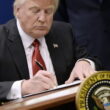The US Supreme Court on Friday gave President Donald Trump a key legal win by limiting the authority of individual federal judges to stop presidential actions from taking effect nationwide.
In a 6-3 decision connected to Trump’s effort to end birthright citizenship, the Supreme Court ruled that lower federal courts likely overstepped their bounds by issuing nationwide orders that halt executive actions.
While the court did not decide whether Trump’s order to end automatic citizenship for children born on US soil was legal or not, it did issue a broader opinion that could impact how presidential orders are challenged in court moving forward.
Justice Amy Coney Barrett, who wrote the ruling, noted, “Federal courts do not exercise general oversight of the Executive Branch; they resolve cases and controversies consistent with the authority Congress has given them.”
She added, “When a court concludes that the Executive Branch has acted unlawfully, the answer is not for the court to exceed its power, too.” Five other conservative justices joined her opinion.
The three liberal justices disagreed with the decision. They warned that limiting judges’ powers in this way could reduce the court system’s ability to check unlawful acts from the White House.
This case began with Trump’s order, signed on his first day in office, which attempted to stop automatic citizenship for children born to undocumented immigrants or temporary visa holders.
Although courts in several states—including Maryland, Massachusetts, and Washington—found the order unconstitutional under the 14th Amendment, Trump pushed the Supreme Court to review not just the citizenship issue but also the broader practice of courts blocking presidential policies nationwide.
The issue has stirred political tension. Trump and his supporters have often criticized judges for delaying or canceling parts of his agenda through what they call politically motivated rulings.
This ruling now gives future presidents, including Trump if he returns to office, more room to carry out executive decisions without facing immediate national stoppages from a single judge.
During oral arguments in May, justices across the ideological spectrum questioned the growing use of nationwide injunctions.
Justice Samuel Alito warned that such orders create challenges, especially when hundreds of district judges may see things differently. Meanwhile, Solicitor General John Sauer said these injunctions work like a “nuclear weapon” that disrupts the balance between the branches of government.
The Trump administration argued that lower courts should only apply rulings to the parties involved in a case, not to the entire country.
While nationwide injunctions have existed under past presidents, they became more common during Trump’s time in office. For example, within just two months of taking office, Trump faced more nationwide blocks than President Joe Biden did in his first three years.
The case has brought renewed focus to the 14th Amendment, which states, “All persons born or naturalized in the United States, and subject to the jurisdiction thereof, are citizens of the United States.” Critics say Trump’s order violated this constitutional rule.








